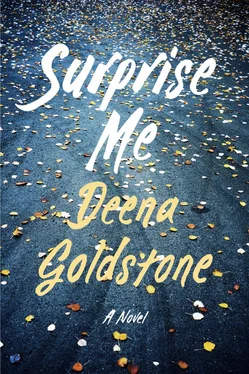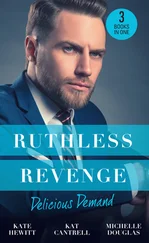He tries to sit up, impatient with the beautiful afghan that gets tangled in his feet, impatient with the oxygen line, which wound itself around an arm as he slept, impatient with Isabelle, who tries to help.
“This is all taking too long!”
She knows he means this long, slow march to the end, but she asks him anyway. She wants him to start talking to her about it all. “What is, Daniel?”
“This dying business. It’s taking too long!”
“Maybe there’s a reason.”
“Yes, the universe has a sick sense of humor.”
“Maybe you’re not done yet. Maybe you have things to do.”
“Oh, spare me, Isabelle, you sound like some New Age blissed-out airhead ! ‘Things to do’? Yes, I have things to do, but they all involve living, and all that’s fucking ahead of me is dying! So stop serving up nonsensical pabulum like I have ‘things to do.’ ”
The vehemence of his words, the blatant attack on her, backs her away. She’d like to walk right out on him, but she feels she can’t. The best she can do is move across the small room and sit at the kitchen table. Turned away from him, she watches the rustle of the birch leaves, bright green against the paper white of the trunks. She’s disappointed in him — wounded, if she’s honest. Daniel, of all people, knows how often she calls into question her own intelligence, feeling in her darkest moments that she doesn’t have the uniqueness, the smarts, she would like to, and that is exactly the soft spot he went for. Unfair, uncalled for, even if he’s sick.
And he knows it. He sits on the couch silently cursing himself and fumbles to apologize, something he’s rarely moved to do in this life.
“You need to stop pushing me,” is what he comes up with.
She shakes her head, not looking at him. There are tears there for the first time since she’s come — this is all so hard, he’s in so much despair — and she doesn’t want him to see them.
“Will you make us some tea?”
And she gets up and busies herself with the kettle and the stove. She takes some deep breaths.
He watches her, silent. There’s an emptiness between them, and she lets it fill the room. She has no idea what to say.
Finally he starts talking. “I started the book way before I knew I was sick.”
“I know that.”
“But maybe some part of me knew it.”
“Maybe.” And then she turns to face him and asks carefully, “What were you writing about?”
“Old age. Dying. Even though I felt completely fine. Explain that.”
It’s a genuine question, and she thinks about it a moment before she answers. “You’d just turned seventy. You knew what was ahead of you, and you wanted to work it out in your writing before you got there. That’s what you do, Daniel — you figure it out as you write.”
And she brings the two mugs of tea over, sits on the sofa with him, hands him his. They take a sip, and then Isabelle thinks of what she’s going to say next and a small smile plays at the corners of her mouth.
“That’s what we writers do,” she tells him, amending her earlier statement.
And he grins back at her, giving in, she feels, agreeing.
“Yes,” he says, “that’s what we writers do.”
Now, in the afternoons, instead of listening to Isabelle read to him from someone else’s work, Daniel lies on the sofa and talks to her about his unfinished novel. About how his character, whom he has named Jack Dyson, came to him.
There had been an op-ed in the Sunday New York Times about the approaching fifty-year anniversary of the Berkeley Free Speech Movement, that moment in history when for the first time college students took over a campus and demanded their right to a voice. The point of the piece was to contrast the activist students of the sixties with the self-involved students of today, their concerns narrowed to their own personal dramas, brought to them on tiny cell-phone screens. But Daniel’s attention had been caught by a brief mention of a former activist who had been one of the acknowledged student leaders and had then spent the rest of his life in the margins.
It was easy to Google Bob Gelfant and learn that here was a man who had led students into Sproul Hall in 1964 to begin the Berkeley sit-in, who had quit college to travel to Columbia University when that campus exploded, then to Kent State in 1970, where four students had been killed by the police. After that he had gone underground and continued to organize and protest and defy the laws he felt were unconstitutional. He was rumored to be part of the Weathermen, but whether or not that was true, he had slipped out of sight.
Daniel wondered what this man, who would now be in his seventies, thought of the sacrifices he had made for his ideals, whether his youthful choices and their consequences haunted him.
“I decided that my guy, Jack, had been on the run for at least twenty years,” Daniel tells Isabelle now. “Along the way he had acquired a wife and two children, and they all assumed new identities every time they moved, and that was often because they could never stay in one town too long. He managed to evade arrest for decades. The question for me was, what would such a man think of his life at the end of it? When he was facing his own death.”
“You wanted to write about regrets.”
“Yes,” Daniel said, “because even if a man is following an inner imperative, even if he feels he has no choice in the matter, there are losses along the way. That was the question I was exploring in the book.”
“What were Jack’s primary losses?”
“One of his daughters, the oldest one. She blames him for her mess of a life. Those years of hiding and fear — she believes all that furtiveness ruined her and that it’s his fault.”
“Ahhh,” Isabelle says, and then keeps quiet. She waits for Daniel, and he finally says, “Echoes of my own life. You can say it, Isabelle, I’m not an idiot.”
“Do they reconcile? In your book, do the father and daughter reconcile?”
“I don’t know. I didn’t finish writing it.”
“I’d like to know,” she says, and leaves it at that.
—
THE NEXT AFTERNOON, AFTER ISABELLE has made them lunch and cleaned up and Daniel has made his way to the couch and quieted the round of coughing the exertion has cost him, each of them settles in. Daniel wraps the afghan around his legs. Isabelle pulls an easy chair up alongside and continues their conversation of the day before.
“What would this Jack Dyson have to do to win his daughter’s forgiveness?”
“I don’t know that he could. His daughter is angry beyond all measure. And a mess. Did I mention she’s a complete mess?”
“Several times.”
“Well, that’s the problem.”
“How much of this have you written? How many pages do you have?”
Daniel waves his hand in the general direction of the wooden table where he works. Isabelle has no idea what he’s doing.
“What?”
“It’s in the cupboard there — the pages. Two hundred and some.”
“And?”
“Oh, Isabelle, don’t be dense. Go get them and read them and then we can have an intelligent conversation.”
She leans over and kisses him. “You are a dear and infuriating man.”
“Right, right,” he says, but he’s smiling.
—
ISABELLE TAKES THE PAGES HOME with her to Bev’s, where she’s staying, and settles down to read in one of the two small love seats framing the fireplace. It’s quiet in the old Victorian house because Bev spends the evenings with Daniel, cooking him dinner, which he barely eats, putting him to bed, and staying with him until Daniel insists that she go home.
While she’s gone, Isabelle plans to get a good look at Daniel’s novel in progress. The manuscript rests on her lap, but instead of picking up the first page, her hands lie idle. She looks around the overstuffed living room, decorated with all the handicrafts Bev is constantly making — knitted throws of mohair and wool, patchwork pillows, a beautiful circle quilt hung on one wall like a tapestry.
Читать дальше












